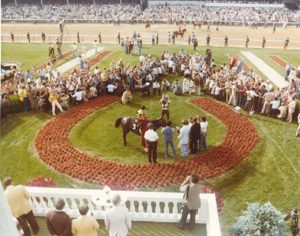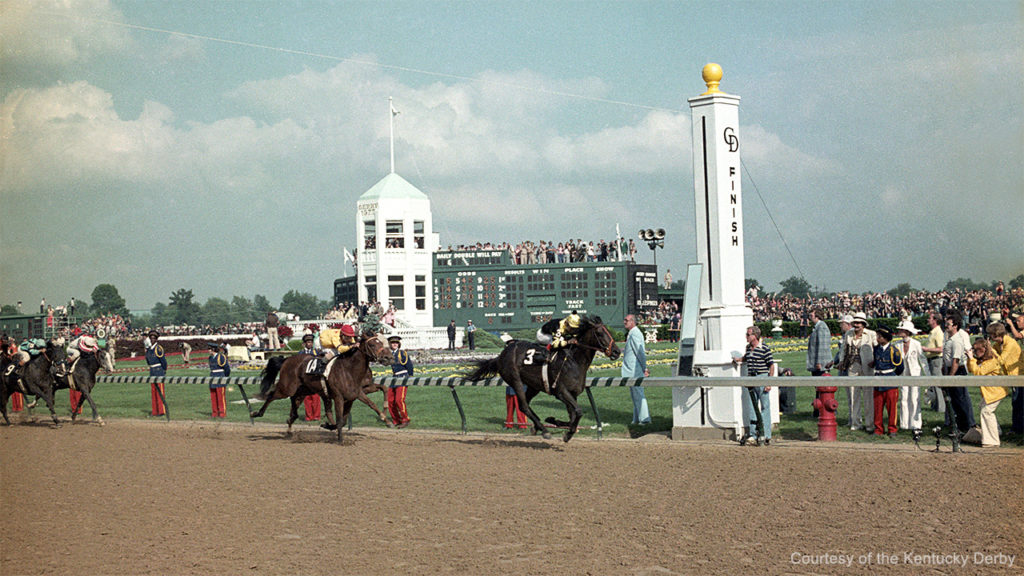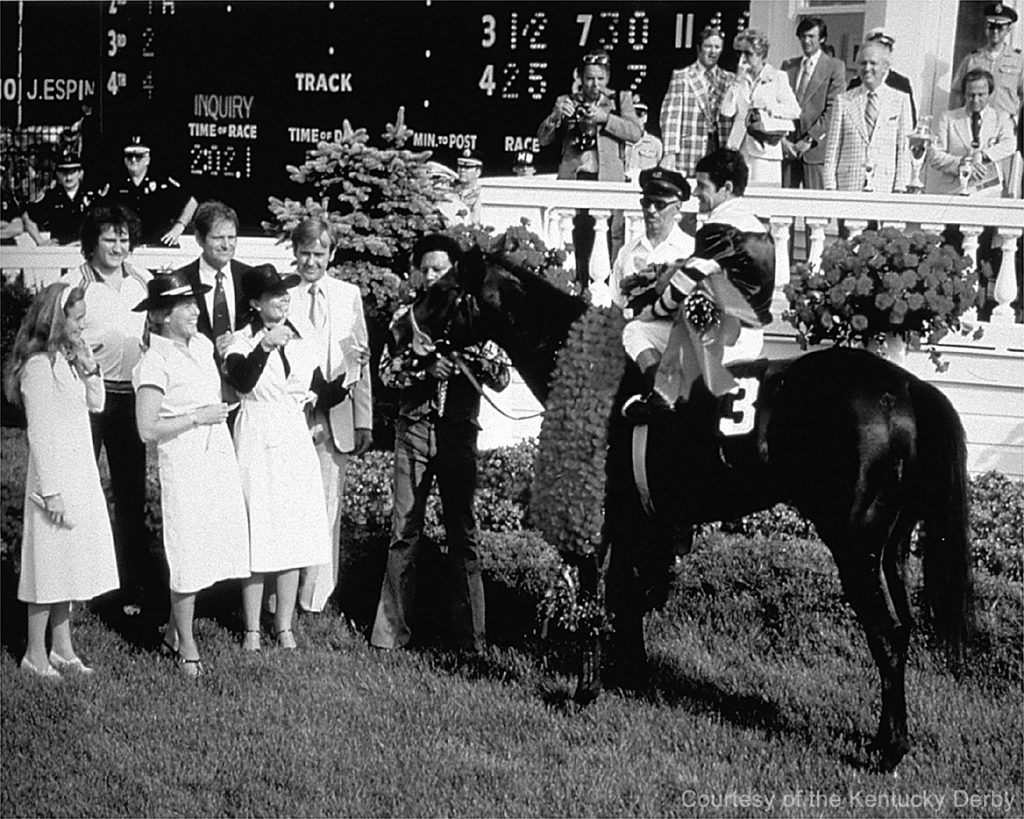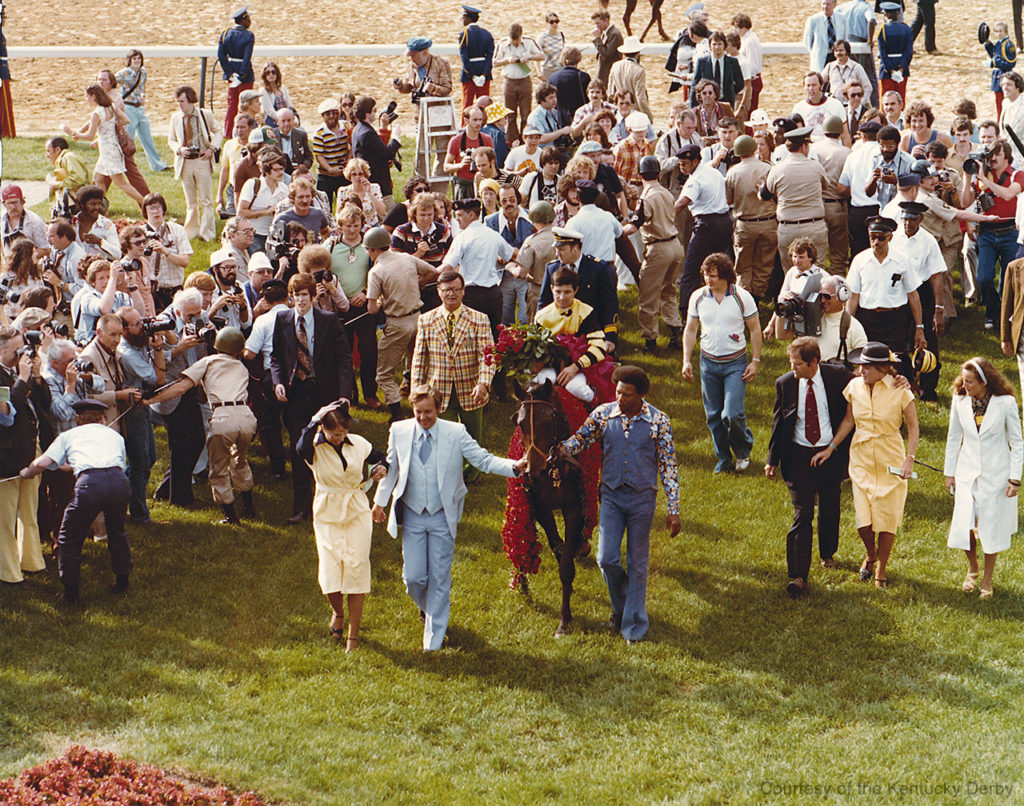
Seattle Slew took no prisoners during his Hall of Fame racing career.
A front-running speedball, the powerful dark bay earned four Eclipse Awards, including Horse of the Year honors, and won 14-of-17 starts over three seasons. One of the preeminent sires in Thoroughbred history, Seattle Slew died in 2002, and he’s still known by casual fans for his greatness on track and at stud.
“He’s superior to all, human or four-legged,” explained longtime groom Tom Wade, who cared for Seattle Slew for more than 20 years. “He has this air about him.”
He’s superior to all, human or four-legged
Groom Tom Wade
Slewmania became prevalent during his 1977 Triple Crown conquest. The first 3-year-old to sweep the Kentucky Derby (G1), Preakness (G1) and Belmont Stakes (G1) while undefeated, Seattle Slew seemed cut from a different cloth. Along with Secretariat, Affirmed, Alydar, and Spectacular Bid, he helped elevate the Triple Crown’s stature during a golden decade for horse racing.
However, Triple Crown glory nearly didn’t happen when Seattle Slew flubbed the break at Churchill Downs. Considering the circumstances, the Kentucky Derby was arguably the greatest win of his Hall of Fame career. It remains one of the remarkable performances in the 146-year history of the Run for the Roses.
Background, the phenomenon

Seattle Slew was a popular phenomenon, a people’s horse because he wasn’t a blue-bloodied prospect.
Respected horsemen did not like his gait or looks as a youngster. As a result, Seattle Slew sold with the cheaper stock at auction, bringing a relatively inexpensive $17,500 at the Fasig-Tipton Kentucky summer sale. Co-owners Mickey and Karen Taylor were new to the game and did things differently, traveling via camper with the horse. This team wasn’t part of the racing establishment, with eccentric trainer Billy Turner and unheralded Frenchman jockey Jean Cruguet adding to the appeal.
A son of Bold Reasoning, Seattle Slew opened his racing career in 1976 with a pair of convincing wire-to-wire wins over maiden and entry-level allowance foes at Belmont Park early in the fall.
He spectacularly made his stakes debut in the 105th edition of the Champagne (G1) in mid-October, finishing extremely fast under a hand ride to score by 9 3/4 lengths and establish a new stakes record for the one-turn mile (1:34 1/5).
Although a number of prestigious juvenile prizes remained that fall, Turner surprisingly elected to freshen his charge for a 3-year-old campaign. Seattle Slew was named champion 2-year-old male after three starts.
Seattle Slew still hadn’t raced over two turns yet, but Turner was confident his pupil would be tractable enough to carry his blazing speed the 1 1/4-mile distance of the Kentucky Derby on the first Saturday in May. The conditioner said Seattle Slew would be able to sit behind horses in future starts, telling reporters after the Champagne, “If he doesn’t win the Triple Crown, I haven’t done my job.”
Many racing analysts at the time disagreed. It was easy to envision Seattle Slew as more of a sprint/middle-distance specialist, a one-dimensional speed horse who the competition would catch up with at longer distances in the spring. Seattle Slew never did become tractable, a lead-the-pack type who refused to ever settle willingly behind another horse. But the competition didn’t catch up to him because he could run all day.

Seattle Slew opened his 3-year-old season in a 7-furlong allowance at Hialeah, dueling through hot fractions before drawing off by nine lengths, and established a new track record (1:20 3/5). His 6-furlong split (1:08) was faster than the existing mark. He came back 17 days later to easily defeat a suspect group of rivals in the Flamingo (G1) at 1 1/8 miles.
His final Kentucky Derby prep came a month later in the Wood Memorial (G1) at Aqueduct. After opening a sizable advantage in upper stretch, Seattle Slew won by a diminishing 3 1/4-length margin. He lacked his normal flair in the workmanlike effort, and received flak after stopping the teletimer in 1:49 3/5, more than two seconds slower than Bold Forbes a year earlier.
Connections said Seattle Slew wasn’t fully cranked, they were saving something for the upcoming major engagements, but Angel Cordero Jr., rider of runner-up Sanhedrin, summed up a common sentiment among Seattle Slew detractors after the Wood. “My horse deserves a shot in the Derby,” the Hall of Fame jockey told the media. “This other one is the best 3‐year‐old right now, but he can be beaten in the Derby.”
Derby Day, super horse or super bust
On a gorgeous afternoon in Louisville, Kentucky, 124,038 people gathered under the Twin Spires to find out whether Seattle Slew was the proverbial Super Horse, or Super Bust.
…an especially great occasion may be at hand
Jim McKay
“There’s a real anticipation that perhaps an especially great occasion may be at hand,” Jim McKay said at the opening of the ABC broadcast. “For only the ninth time in the history of the race, an unbeaten favorite will go to the post…Seattle Slew, is he another Secretariat? Well, we’re going to find out.”
Seattle Slew drew post 4 in the 15-horse Kentucky Derby field, but had to be saddled first in an intense and crowded paddock scene. Big and hard to handle at times, he was a hot-blooded individual with an intense determination to run fast, and the process did not go well as the temperamental colt emerged for the post parade drenched in sweat.
Things got much worse when Seattle Slew was caught flatfooted at the start.

“Seattle Slew broke slowly,” ABC announcer Chic Anderson said of the 1-2 favorite, who spotted the field several lengths while coming out of the gate nearly sideways.
The unbeaten dynamo had never been behind horses in a race, new territory in the face of an extreme challenge, and all plans went out the window as Seattle Slew took off in a mad rush for the lead from the inside. Cruguet deftly guided his mount through congested traffic, somehow managing to avoid getting stopped in a race where other jockeys are trying to beat the heavy favorite.
After blasting his way through a perilous spot, Seattle Slew engaged the front-running For the Moment, who had retained the services of Cordero following a win in the Blue Grass (G1) at Keeneland. Cordero upended 2-5 favorite Honest Pleasure in the 1976 Kentucky Derby aboard Bold Forbes, and the supreme reinsman was seeking another wire-to-wire upset. The pace was hot and contested through opening fractions in :23, :45 4/5, and 1:10 3/5.
Seattle Slew began to edge away on the far turn and widened the lead into the stretch, reaching the sixteenth pole with a three-length advantage. The outcome was never in doubt as he rolled to a 1 3/4-length decision.
At the finish it’s Seattle Slew, and he’s going along easily
Chic Anderson
“He broke badly and was boxed in like that,” Turner told reporters after the Kentucky Derby. “Then he showed he had all the courage we knew he had. He ran the hardest race of his life. It shows that when he’s hooked (challenged head-to-head), he doesn’t give anything up.”

Legacy, tough and game
Seattle Slew was as tough and game as they come throughout his stellar racing career. He came back too quickly after winning the Belmont Stakes, shipping cross-country for the Swaps (G1) at Hollywood Park 22 days later, and sustained his initial loss. The setback exacted a severe physical toll, forcing him to the sidelines for the rest of his 3-year-old season, and Seattle Slew had to overcome a viral infection early in 1978.
Seattle Slew won 5-of-7 attempts at age 4, and his courage radiated during an epic nose loss to Exceller in the 1978 Jockey Club Gold Cup (G1), considered by many to be the greatest performance in defeat in American horse racing.
Cordero, who rode Seattle Slew in his final four starts, recalled the superstar’s intelligence on ESPN’s SportsCentury.
“I see Seattle Slew right next to me (in the Kentucky Derby) and I said, ‘Wow, this horse came in quick.’ And I looked and there he was like this, looking at me. I never, never noticed a horse that can look at me, but he was looking at me. Seattle Slew just kept looking at me, passed me and took every other challenge from behind. And I said to myself, ‘That horse is a champion.’”



thanks for the memories—so great so great